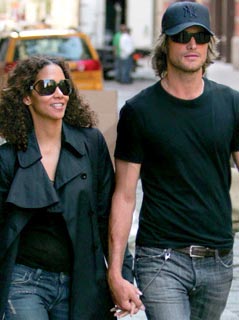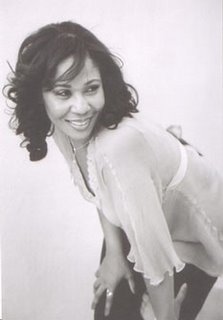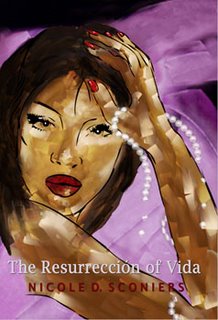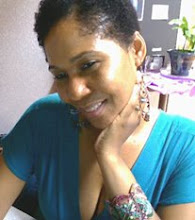Black Women and the “Something New” Movement
 Bossip, an urban entertainment blog, recently posted pictures of actress Kerry Washington, a black woman, with her fiancé David Moscow, a white man. Beneath the image of Kerry gazing lovingly at her betrothed is the caption: “You have saved me from all these trifling niggas, David!”
Bossip, an urban entertainment blog, recently posted pictures of actress Kerry Washington, a black woman, with her fiancé David Moscow, a white man. Beneath the image of Kerry gazing lovingly at her betrothed is the caption: “You have saved me from all these trifling niggas, David!”I realize that most of what Bossip and many other black entertainment blogs write is tongue-in-cheek, especially when it comes to interracial couples. But hidden beneath the humor is the notion that the white man is the sister’s savior when it comes to relationships, a white knight redeeming the dark diva in distress.
Lately, I’ve noticed that many black women applaud (if not downright encourage) their sisters’ decisions to date interracially, a move that would have been labeled as selling out just ten years ago. “Sisters can do it too!” seems to be the battle cry of this dating revolution, what I call the “Something New” movement. When Halle Berry started making the rounds with blonde hottie Gabriel Aubry, the response from black women seemed to be: “Go for yours!” As one gleeful female blogger put it, “All the brothas are just mad ‘cause her main man right now is white. She gave negroes a chance, and they screwed up!”
Part of this paradigm shift is in direct response to the growing number of black men/white women relationships. I’ll admit that I’m not immune to being reactionary. I live in Los Angeles, which has been dubbed the “Jungle Fever” capitol of the West Coast, and I often grow weary of seeing Heidi on Hakeem’s arm. For a few months, I was actively seeking a white man to date, even crushing on several white male friends. I was seriously contemplating creating tee shirts emblazoned with the slogan “Looking for Mr. White,” and passing them out to all my black girlfriends in defiance of these clichéd “brothers with others” couplings.
I realize that I’m embracing a double standard. I am loath to watch anything featuring Taye Diggs or Cuba Gooding, Jr. because of the “white wife” factor, yet I give props to Grey’s Anatomy cutie Justin Chambers for having a spouse named Keisha, and to green-eyed soul singer Robin Thicke for flaunting his black wife, Paula Patton, in his videos. I avert my eyes when I see Heidi-Hakeem hookups in the malls, restaurants or streets of L.A. – projecting onto these couples the same invisibility and marginality that I experience on a regular basis – yet I give a fist-in-the-air smile when I see Rasheeda hugged up with Biff. It’s as if these white men are affirming the beauty, value and self-worth of black women in a culture that relegates them to video hos, emasculators, corporate shrews or gold diggers. These couplings are also a slap in the face to a society that places a premium on white womanhood.
Yes, I know that love is – and should be – colorblind, but many black women are crossing the color line in relationships out of necessity. According to a 2005 U.S. Census report, 43.4 percent of all black women have never been married. We are confronted daily with statistics about the shortage of eligible brothers, in addition to the academic and professional disparities that exist between the sexes. In an MSNBC article, Sanaa Latham, star of the movie Something New, shares her own dating quandary. “It has to happen, if we don't want to be alone,” she says regarding the rise of black women’s interracial relationships. Yet she admits that black men can be the harshest critics of said relationships – even those brothers who have white women hiding in their sexual repertoires.
Sanaa recalls the backlash she felt for being with a “white, liberal, educated” man. She says, “There was moments with him where like we would be in Harlem. There would be five brothers on the corner, and this is an awful feeling but you're holding his hand and you want to pull your hand away ‘cause you don't want the judgment. And you're gonna get the judgment even if it's just in looks.”
 Why are black women held to a more stringent standard when it comes to dating outside the race? Why are black men allowed to experience color-blind love every time they step out with a non-black woman, while sisters are accused of being race traitors, constantly reminded of our antebellum past when black women were objectified, infantilized and raped by their slave masters? This lack of balance and fairness further serves to marginalize us and reinforces the notion that we aren’t being heard or taken seriously by our male counterparts.
Why are black women held to a more stringent standard when it comes to dating outside the race? Why are black men allowed to experience color-blind love every time they step out with a non-black woman, while sisters are accused of being race traitors, constantly reminded of our antebellum past when black women were objectified, infantilized and raped by their slave masters? This lack of balance and fairness further serves to marginalize us and reinforces the notion that we aren’t being heard or taken seriously by our male counterparts.Except for one relationship, my preference has always been black men, and I never imagined being with anyone but a brother. But as I grow older, I’m learning to keep my options open. Sisters have to demystify deeply-rooted beliefs we have concerning our interracial relationships. This will challenge us to rethink the long-held notions of “loyalty” we have regarding black men. I don’t want to go on a quest for “Mr. White” simply to combat the black men/white women pairings I see on the regular. I know society tries to ascribe fear on our hearts based on statistics and the threat of spinsterhood, but I refuse to engage in an inauthentic relationship for fear of growing old alone. I’m not averse to trying “something new,” as long as I do it based on mutual attraction, not redemption.




